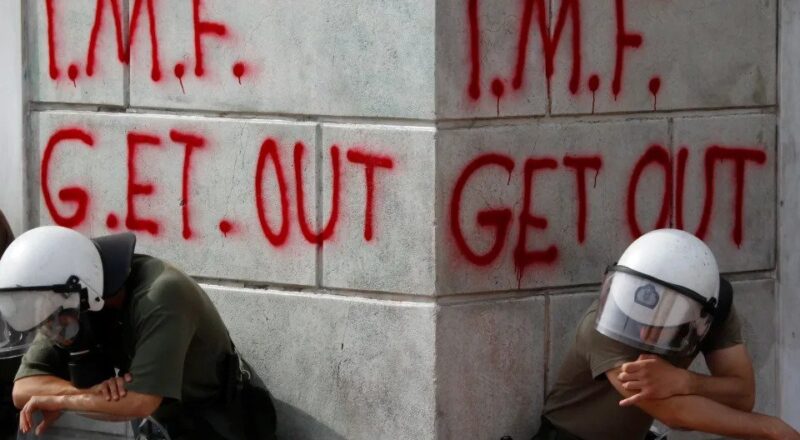Cover photo : Greek riot policemen stood at the wall of a bank written by the discontentment of Greek citizen during violent demonstrations over austerity measures in Athens. Photo credit : REUTERS (2010).
Volume 9, Number 2, December 2022 | Essay
Greece went into one of the most severe financial crises since the Great Depression in 2009, known as Greece’s sovereign debt crisis, due to its extraordinarily high debt. After that, the Greek economy collapsed. The people had to live under the debt burden of their country, paying extreme taxes with extreme job losses. It also took Greece a decade to get out of the crisis and its impacts on the economy are still visible. In fact, there are international attempts to pull this country from its trap as there seemed no way out for the country itself. One of those is the help from the International Monetary Fund. The Troika agreed to bail out Greece 3 times, which amounted to over 280 billion euros, together with some austerity measures that the country must follow. However, the IMF took the wrong action in giving Greece rescue packages because it worsened the economic conditions of Greece, led to political instability, and only helped the bankers, not the people.
It is very clear to say that the Greek economy worsened after the country received the bailouts. The basic concept behind this is that when the international organization, the IMF in this case, is willing to give out a rescue package to a country in a crisis, it has to condition for some austerity measures. Austerity measures are established to improve the economic condition and decrease the default risk of the received country. Those conditions are usually high taxes increase and government spending cuts to rebalance the debt position. However, the economic condition of Greece was more complicated than this. After Greece received the bailouts, its GDP was reduced by almost a third, and the unemployment rate reached 24 percent within 5 years (Mohan, 2016). This slump in the economy is a result of austerity measures required by the IMF for Greece to raise the tax collected from the people, lay off public servants, and cut pensions. Therefore, it raised the question of whether the IMF austerity measures were well-designed or not since the IMF should have expected severe economic loss in Greece. In fact, there were many debates on the feasibility of the rescue programs at that time the IMF offered them to Greece. Most of the concerns were on the sustainability of Greece’s debt because basically the bailout is just to add another pile of debt to Greece (Elliott, 2018). In fact, its public debt to GDP ratio increased from 120 percent before the first rescue fund was granted to 170 percent. That means the debt burden actually became higher and it is more likely for Greece to default. With all those consequences on Greece’s economic condition, the IMF was criticized for its austerity measures.
Another flaw of the IMF’s bailouts is they caused political instability in Greece. As mentioned earlier, the Greek people have been living under the economic pressure of high taxes and high unemployment. This has driven up the discontentment of Greece’s citizens as they were condemning their government for the cause of severe debt. Once the government called for a national referendum on the requirement for the second bailout from the IMF, the result was that the deal was turned over and the president at the time had to step down. The Greek people were also hurt by the austerity measures that were enacted by the government. Therefore, this led to several protests on the streets in many parts of the country. For example, a May Day celebration in Athena turned into harsh protests in 2010. A crowd of people ran into clashes with the police riot together with a petrol bomb from the people. This even worsened the economy of Greece further as people were striking and businesses needed to close (Smith, 2010). Furthermore, the IMF as well as the European Union has taken away the policy authority of Greece. The fiscal policy of Greece had to be set in a way that it could meet the criteria of the IMF as part of the austerity measures. There have been some criticisms that the country should better have its own authority to implement its own fiscal policy. In other words, the IMF was focussing heavily on the debt position of Greece in order to get the loan repaid, not on the economic outcomes that the people have to face.
The IMF action should also be questioned as to who is the one they were trying to serve. Greece was a debtor of the rich countries in the eurozone, to which Germany contributed the largest amount in Greece’s sovereign debt. Thus, it raised the dissatisfaction of the European people as they lent to a country that had high default risk or they were at risk that they will not getting their money back anytime zone. In fact, there were a lot of talks that Greece should get out of the European Union because of its extraordinarily large amount of debt. Even worse, when the IMF put another pile of debt on Greece, the country owed money from major European banks, there were many criticisms from the people about why the European Union members needed to take this burden and give emergency help to Greece as it seemed not to be their responsibility. Furthermore, it was reported that less than 10 percent of the money bailed out by the IMF was left for Greece to recover its economy. The bailout was used to pay banks and investors as the first priority before it went into spending for economic growth. Therefore, it can be asked for which purpose the IMF gave the rescue packages to Greece: to help the bankers or to recover the Greek economy.
In conclusion, the IMF should be blamed for the long-lasting crisis of Greece’s sovereign debt because the bailout programs deteriorated the Greek economy, caused severe political instability, and helped only the bankers, not the people. If the IMF did not step into Greece, the country might have ended up with a better outcome.
References
Dullien, S. et al. (n.d.) The IMF to the rescue: Did Greece benefit from the Fund’s experience in dealing with highly indebted countries?. Retrieved from https://www.lai.fu-berlin.de/homepages/fritz/publikationen/191021_the-ifm-to-the-rescue_did-greece-benefit-from-the-funds-experience-in-dealing-with-highly-indebted-countries_1_.pdf
Elliot, L. (2018, August 19). Greece’s bailout is finally at an end – but has been a failure. The Guardian. Retrieved from https://www.theguardian.com/world/2018/aug/19/greeces-bailout-is-finally-at-an-end-but-has-been-a-failure
Inman, P. (2015, June 29). Where did the Greek bailout money go? The Guardian. Retrieved from https://www.theguardian.com/world/2015/jun/29/where-did-the-greek-bailout-money-go
Johnston, M. (2022, July 2). Understanding the downfall of Greece’s economy. Investopedia. Retrieved from https://www.investopedia.com/articles/investing/070115/understanding-downfall-greeces-economy.asp
Kelsey, R. (2015, June 29). Greek money crisis: Who does Greece owe money to? BBC News. Retrieved from https://www.bbc.co.uk/news/newsbeat-33311535
Mohan, R. (n.d.). How the IMF bungled the Greek debt crisis. The Wire. Retrieved from https://thewire.in/economy/imf-and-greece-crisis
Smith, H. (2010, May 1). Greece erupts in violent protest as citizens face a future of harsh austerity. The Guardian. Retrieved from https://www.theguardian.com/world/2010/may/02/greece-violence-bailout-imf-euro












































I have heard many criticisms of the IMF with regard to the conditions of its loans, and this essay has provided a great illustration of the IMF’s lack of accountability in various areas. The problem includes the IMF’s loan being conditional on the implementation of certain economic policies such as higher taxes and lower government spending, as you mentioned. The consequences of these policies on macro intervention can make economic situations worse. In a similar vein to Greece’s crisis, the role of IMF policies in the Asian Financial Crisis also deteriorated economies and resulted in extremely high levels of unemployment.
Very interesting essay and I agree with you that the IMF and its policies in Greece had brought many negative effects on the country’s economy, and I think the IMF should not have intervened in Greece from the beginning. What is really strange is that IMF – which is not elected by anyone from Greece- determined the internal policies of Greece, the extent of economic prosperity, and the destiny of citizens, and announces its mistakes in expectations and policies without anyone holding it responsible, so Greece stayed alone to try to correct the mistakes of IMF by itself.